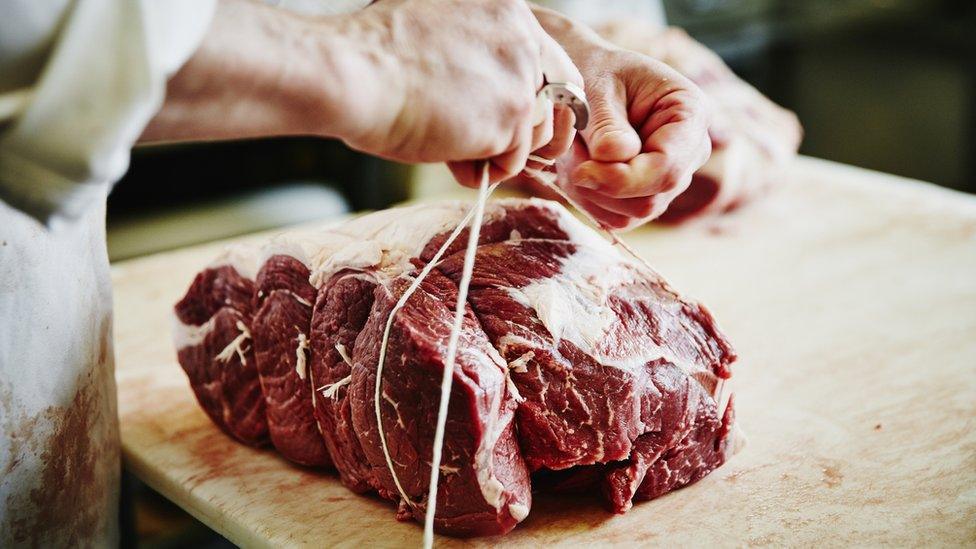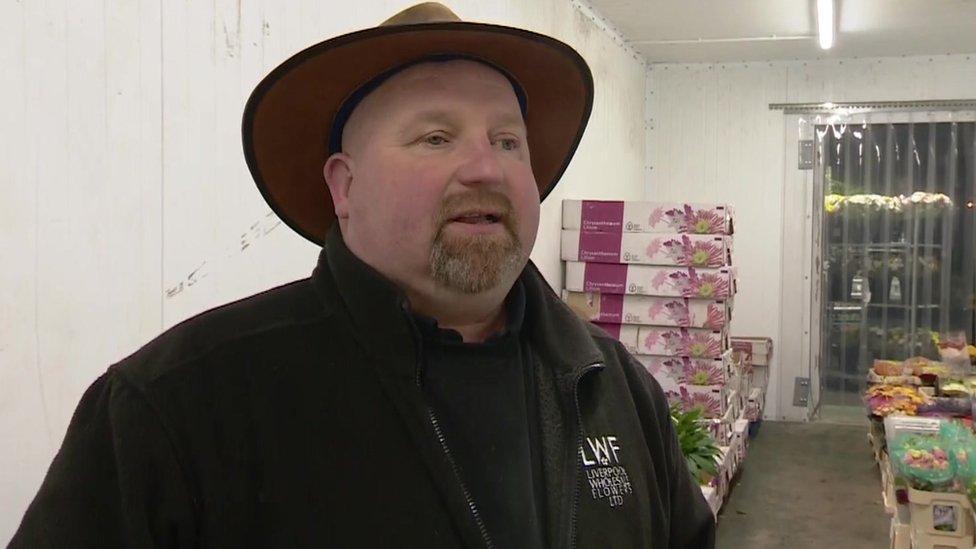Post-Brexit controls on food and farm imports start
- Published
- comments

Britain relies on the EU supplying the bulk of its beef imports
Post-Brexit controls on food, plant and animal imports to Britain from the EU have come into force.
Health certificates will now be required on EU goods ranging from cut flowers, to fresh produce including meat, fruit and vegetables.
Some industry bodies raised concerns the rules could cause delays and push up costs, but others said they would help UK farmers be more competitive.
The government said its border model would "minimise burdens for traders".
The UK left the EU exactly four years ago, but it has taken some time for the government to implement new trade rules - legally required under the Brexit agreement - for goods travelling from the EU to the UK.
Wednesday marks the start of the changes as Britain begins reversing the free flow of such goods, which has been allowed since the creation of the EU single market in 1993. Red tape has already applied for British exporters trading in the other direction for three years.
The implementation of the changes has been delayed five times, in part to give businesses time to prepare and to reduce disruption to supply chains. The new border checks will also be phased in over the next year, with physical checks starting from 30 April.
The physical checks down the line have prompted fears of disruption to business supply chains. For example, lorries carrying goods could be stopped at ports to ensure they have the correct documentation. Concerns remain that extra checks will see import costs for businesses rise, and in turn prices for consumers.
But from Wednesday, the main change is the introduction of "export health certificates" on imports of "medium risk" animal products, as well as plants and plant products imported to Britain from the EU. The trade rules cover goods ranging from cut flowers, to cheese, fish and meats.
This means a veterinary health check will be required to be carried out in the EU on every consignment of meat, fruit and vegetable produce set to enter Britain.
While not all produce will require checks, in practice importers tend to have a mixture of goods, so most consignments will do, according to industry experts.
Controls are also being applied on goods from Ireland for the first time, but the government said its Windsor Framework means goods will move freely to and from Northern Ireland.
Ben Appleton from Liverpool Wholesale Flowers told the BBC there was no need for the extra bureaucracy.
"A lot of it is already checked before it leaves anyways. On plants especially, we have plant passports in place anyways and that was all done prior to Brexit in the first place," he said.

Ben Appleton says his import costs will rise as a result of the controls
"Practically, it's just more costs. That's it, plain and simple. And it's another set of costs that we have to pass on to the florist, [and] eventually to the people in the High Street."
Vet capacity
The British Meat Processors Association (BMPA) raised concerns about the physical inspections due to start in three months' time.
It said the clock was now ticking for new checks on imported meat coming in on 30 April, "but it's far from certain it won't cause disruption in the supply and a hike in the cost of some of our meat staples".
Britain imports 22% of its beef, 21% of its sheep meat and 49% of its pork, and relies on the EU for the bulk of those imports, the BMPA said.
The trade body added it had been warned of a lack of veterinary capacity among EU exporting countries, and that some EU vets might not be prepared to sign the health certificates needed to be able to export meat, due to requirements diverging since Brexit.
"Put bluntly, if the vets aren't able to sign off the documentation, consignments of meat may not even leave the factory, let alone get to a UK Border Control Post," the BMPA said.
The government admitted the extra red tape and checks would increase food prices, but not as much as seen in recent times. It has forecast the controls could push up inflation by 0.2 percentage points over three years.
It added health certificates were being "digitised and simplified" from current paper-based forms and was a step in "making the UK the most advanced border in the world".
"Our aim is to have border controls which maximise the protection of the UK population from harms such as drugs and animal and human diseases while minimising the disruption to legitimate trade," said Lucy Neville-Rolfe, minister at the Cabinet Office.
"We have worked with traders and businesses extensively to design the controls and will continue to listen to their feedback," said Baroness Neville-Rolfe.
Different sectors, different needs
The National Farmers Union (NFU) said the livestock and dairy sectors had been pushing for a speedy implementation of import controls to safeguard UK biosecurity - protecting from imported animal and plant diseases - and competitiveness.
It said for the past three years, the delays in bringing in checks had disadvantaged UK producers as they had been subjected to EU controls, while EU exporters enjoyed "unhindered access to the UK marketplace".
But Minette Batters, NFU president, said it was essential that border controls recognise the "different needs and nuances" of individual sectors.
She highlighted that while livestock businesses need to feel confident that border checks safeguard against disease and prevent illegal trade, delays to horticulture supply chains could result in plants being "damaged or destroyed".
Biosecurity Minister Lord Douglas-Miller added: "The controls introduced today strike the right balance between trade and biosecurity."
But William Bain, head of trade policy at the British Chambers of Commerce, said there were still unanswered questions around the plans.
"The government still hasn't said what will happen if goods coming into the UK don't have the paperwork they need.
"Will they be stopped from entering or will they be followed up afterwards? This could lead to hold-ups with deliveries if it's not handled properly," he said.
The Environment, Food and Rural Affairs Committee of MPs has also written a letter to Environment Secretary Steve Barclay expressing concerns over the funding for spot checks at the Port of Dover, and the location of the new facility for physical checks at Sevington, some 22 miles away from the point of entry at Dover.
Related topics
- Published2 February 2024
